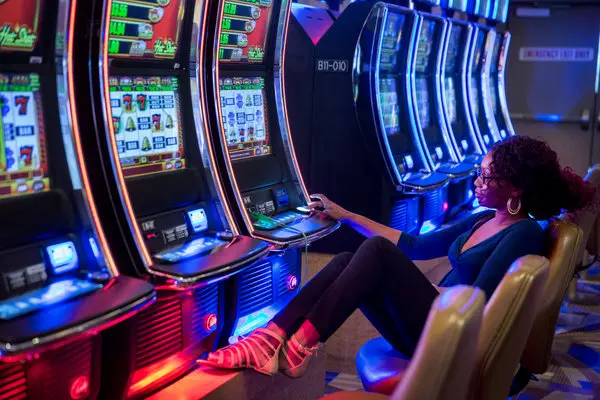
Casinos as Time Machines: When Players Return to Their 20-Year-Old Selves
The Casino as a Portal to the Past
When a player enters a casino – whether online or offline – they are not just chasing money, they are chasing time. Platforms like https://casino-nomini.gr/ demonstrate how a simple spin or bet can make someone feel twenty years younger. The lights, the sounds, the thrill of “maybe this time,” all create the illusion that aging, obligations, and the scars of the past have disappeared. In the digital casino space, gambling becomes more than entertainment; it becomes a time machine, one that carries players back to the person they once were – or the person they wish they could have been.
The Nostalgia Effect: Why Gambling Feels Like Youth
Casinos borrow heavily from nostalgia. The sound of coins dropping, the flashing lights, the instant feedback – all are reminiscent of arcade machines, childhood games, and early risks taken without consequence. For many, gambling reactivates that raw emotional memory: a time when life was full of possibilities, when failure meant nothing more than “try again.”
Regressing to the Age of Hope
In psychology, regression is a return to earlier states of development during moments of stress or excitement. In gambling, regression is voluntary: players actively enjoy slipping back into a version of themselves that still believed in miracles, first loves, and the promise of the unknown.
Casinos as Emotional Time Capsules
Unlike other forms of entertainment, casinos are built on ritual. The spin of a wheel or the deal of a card are not just actions – they are performances repeated thousands of times over centuries. Each time a player participates, they tap into the same emotions someone might have felt decades ago.
The Body Remembers
Interestingly, the body stores emotions differently from the mind. A 50-year-old who presses the “spin” button often feels the same bodily excitement as when they were 20. Heart rate increases, breath quickens, palms sweat. The body doesn’t differentiate between past and present – it simply relives the thrill.
The Psychology of Eternal Return
The Illusion of Second Chances
Casinos thrive on the idea of rebirth. Every spin is “a new chance.” Every bet is a “fresh start.” Players step into a cycle where time doesn’t move forward – it resets endlessly. For some, this is liberating; for others, it becomes a trap.
Youth as a Marketing Strategy
Online casinos often use youthful branding: cartoon mascots, bright colors, playful language. They aren’t just selling games; they are selling youth itself – the feeling that responsibilities can be forgotten, and joy can be reclaimed.
Why the Past Feels Safer than the Future
Gambling as Escape from the Aging Self
Aging comes with financial worries, social responsibilities, and a growing awareness of mortality. Casinos offer a space where those concerns momentarily vanish. Inside the game, the player is not a parent, employee, or spouse – they are simply a person taking a chance, like they once did in their twenties.
Fantasy of “What If”
The casino embodies a constant “what if.” What if I win? What if my luck is just around the corner? This mirrors the way young people think about life itself: “What if I succeed? What if tomorrow everything changes?”
Stories of Players Who Gamble to Feel Young Again
Across countless testimonies, older players confess that gambling is less about money and more about memory. A retired teacher may log in to a slot machine at midnight not to pay bills, but to relive the sensation of being 25, when the night was still full of mystery. A widower might play poker online, not because of strategy, but because it mimics the excitement of the days when he had energy, friends, and possibilities.
Online Casinos as Personalized Time Machines
Algorithms That Know Your Past
Modern platforms don’t just provide games; they learn player behavior. By recommending certain slots or repeating familiar bonuses, they essentially reconstruct the personal gambling history of each player – reinforcing nostalgia and recognition.
Design That Evokes the Arcade
The gamification of casinos – with achievements, badges, daily bonuses – mirrors video games from one’s youth. This creates a layered illusion: the player is not just gambling, they are also “playing a game,” which connects them to childhood, before money ever mattered.
The Risks of Living in a Time Loop
Addiction as Repetition
The danger of casinos as time machines is that the loop never ends. Unlike movies or books, gambling has no ending. The story resets every time you play. This can lead to a form of psychological stasis, where players refuse to face the present because the past – manufactured by the casino – feels more bearable.
Emotional Debt
While players may seek youth, what they often accumulate is exhaustion. The same spins that once felt playful can turn into heavy rituals. The longer the cycle continues, the further they drift from reality.
Philosophical Reflection: Gambling as a Rebellion Against Time
At its core, gambling can be seen as a rebellion against the natural order. Time tells us we cannot return to youth, that chances decrease with age, that life is linear. Casinos whisper the opposite: “You can go back. You can start again. You can be 20 forever.”
But is this true freedom – or the cruelest illusion?
Conclusion: The Casino Clock
Casinos, whether digital or physical, are places where time does not pass in the usual sense. For some, they are sanctuaries of nostalgia, where memories of youth are preserved. For others, they are traps, where the cycle of eternal return prevents growth.

Leave a Reply